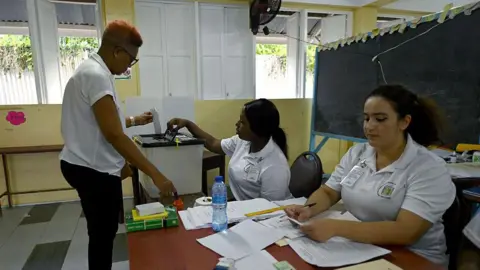As the counting of votes in the Irish general election progresses, the leaders of the three predominant political parties—Micheál Martin of Fianna Fáil, Simon Harris of Fine Gael, and Mary Lou McDonald of Sinn Féin—have successfully retained their seats in the Dáil, Ireland's parliament. Currently, of the 174 total seats, 41 have been filled, with further counts scheduled to continue on Sunday.
The leaders now face the substantial task of negotiating the formation of the next government. Historically, Fianna Fáil and Fine Gael have collaborated in coalition, and early predictions suggest they are on track to secure a combined total of over 80 seats—sufficiently close to the 88 seats necessary for a majority. However, Sinn Féin, currently projected to secure around 40 seats, will need to explore alliances with smaller parties and independent TDs to gain entry into government.
Political analysts note that while Sinn Féin has expressed eagerness to engage in coalition discussions, the party's prospects for leading a left-leaning government appear limited. Recent exit polls suggested they would finish ahead of Fianna Fáil; however, initial results may challenge this forecast.
As it stands, Fianna Fáil has garnered 21.6% of the vote, followed closely by Fine Gael at 20.7%, and Sinn Féin trailing at 18.7%. If this trend holds, it would mark a significant deviation from earlier projections, potentially consigning Sinn Féin back to opposition despite claims of an outstanding performance.
Furthermore, with smaller parties likely to remain in single-digit seat counts, Sinn Féin’s negotiations to establish a coalition may prove complicated, especially given the divergent policy stances shared by Fianna Fáil and Fine Gael, who have indicated a reluctance to form government with Sinn Féin.
Political commentator analysis projects the unfolding negotiations could extend well into the new year, pending confirmation of all seats. Sinn Féin leaders remain optimistic, celebrating their anticipated seat wins, though commentators caution against maintaining such enthusiasm should they fail to secure a position in the next government. The outcome of this electoral event will undoubtedly shape the political landscape in Ireland as parties seek to reaffirm their roles and influence moving forward.





















